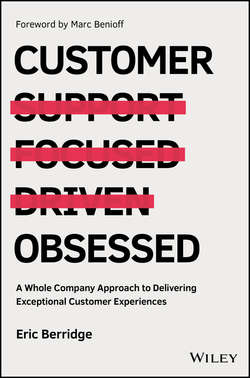Читать книгу Customer Obsessed - Berridge Eric - Страница 5
На сайте Литреса книга снята с продажи.
INTRODUCTION
ОглавлениеGood ideas fail all the time. At the end of every year, the technology literati draw up lists of failed inventions and enterprises, pointing out the pitfalls and mistakes made. This practice has its roots in more than schadenfreude. Their desire, and that of their readers, is to understand failure and to learn from others' stumbling blocks. They want to learn how to succeed (that is, make a profit) for themselves and their customers, and studying past failures is an excellent exercise in what not to do.
Great products and services are the sum of many failures, each carefully combed through to pick out the good and discard the ineffective or detrimental. Take, for example, the iPhone. When it was first released, it was – and still is – a massive success, a true game changer in mobile technology. But Apple didn't start with the iPhone; it started with the Apple Newton.
The Newton was a play for the Palm Pilot market and was released with huge fanfare – handheld, mobile, new user interface, celebrity CEO, great expectations – and yet Apple pulled the plug less than a year after its release. Wired magazine called it a “prophetic failure” and they were right.3 The Newton, based on a cultural hypothetical and vision of the future, heralded a new age of technical innovation. It didn't fail because it was a terrible idea – it failed because it missed the mark in three key areas: data, design, and culture.
Data
Data was not the Newton's strong suit. It allowed the user to input data, but it was static and didn't connect to anything – zero interaction with a larger network.
Design
While the Newton looked cool, there was nothing in the design that trumped what consumers were already using. It was cheaper, faster, and easier to use a $3 notebook.
Culture
We weren't ready for the Newton – we didn't need it. We were barely using cell phones 22 years ago. And when a culture doesn't need something or can't see the value of it, failure is imminent.
Contrast the Newton with a product like Uber. Uber has achieved success because it delivers in ways the Newton could not – live data; simple, intuitive design; and a culture ready to embrace a ride share service that saves time and delivers a better experience.
If we were to map out Uber's success, their path to profitability would look a little something like the framework in Figure I.1.
Figure I.1 Bluewolf's Business Outcomes Framework
Uber's strategy lies in delivering on those four business outcomes: acquisition, expansion, cost reduction, and retention. Not every play supports all four, but every single action involves at least one (see Figure I.2).
Figure I.2 Uber Initiatives Mapped to Business Outcomes Framework
This book is about business survival for the rest of this century. It starts and ends with an obsessive focus on the customer and the ways in which customer experience is affected by other critical issues: the war for talent, employee engagement, leveraging data analytics, collaboration, creating the right culture, hiring and retaining good employees, even technology, although that last point will play the smallest part.
In today's intensely competitive digital world, there is an extremely high threshold for success, which filters out the “good enough” from the best. The purpose of this book is to provide you with a strategic framework to elevate your organization to the upper echelon of customer experience and drive profitability at all levels of your business. Here you'll find real examples of global enterprise success that Bluewolf helped guide to fruition, as well as essays by and interviews with industry leaders. Whether you have concerns about analytics, governance, or gender diversity, this book will provide the answers to the question of how to compete successfully on all fronts in the current digital landscape and deliver an exceptional customer experience.
3
Mat Honan, “Remembering the Apple Newton's Prophetic Failure and Lasting Impact,” Wired, August 5, 2013, http://www.wired.com/2013/08/remembering-the-apple-newtons-prophetic-failure-and-lasting-ideals, October 17, 2015.
